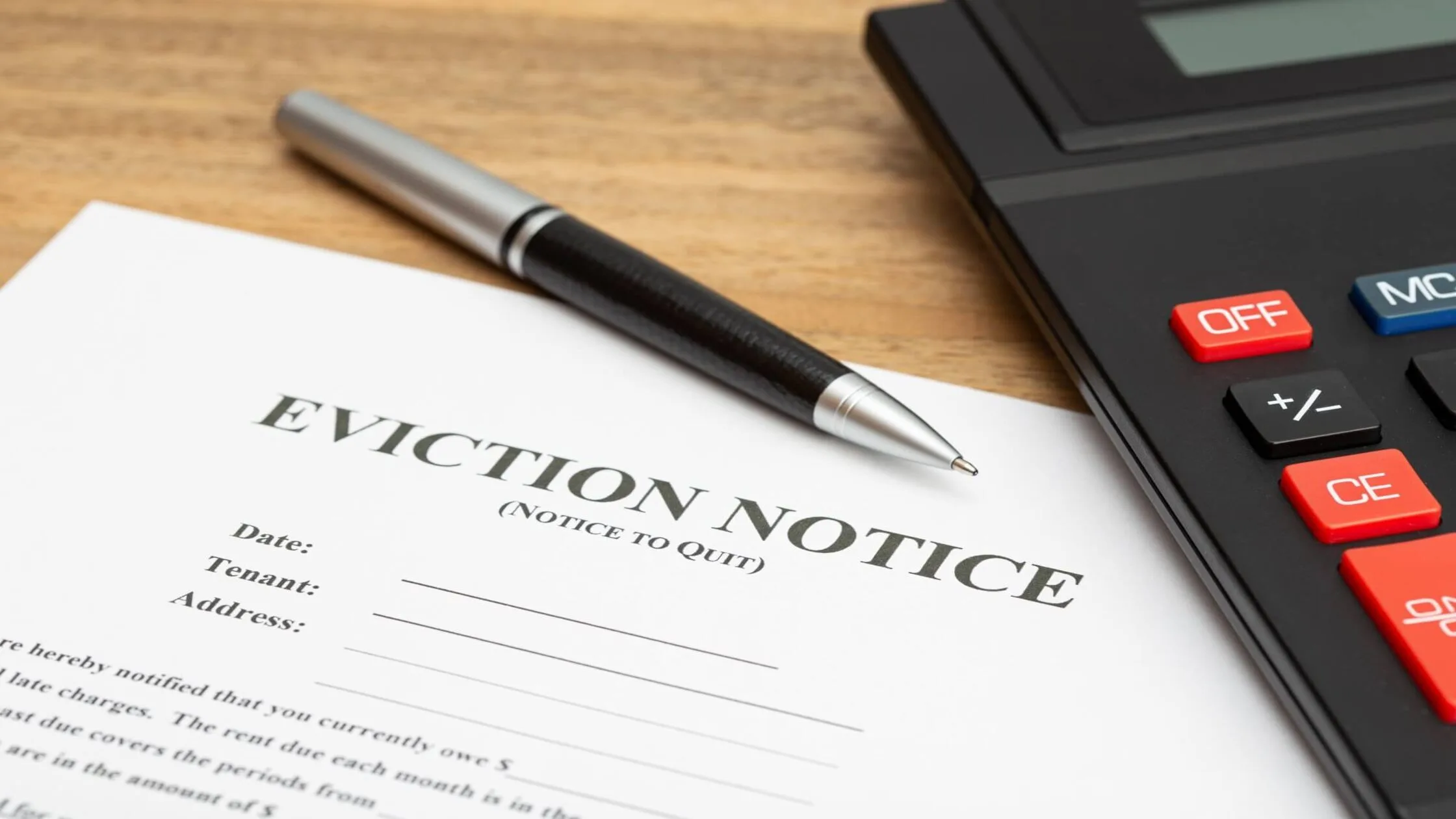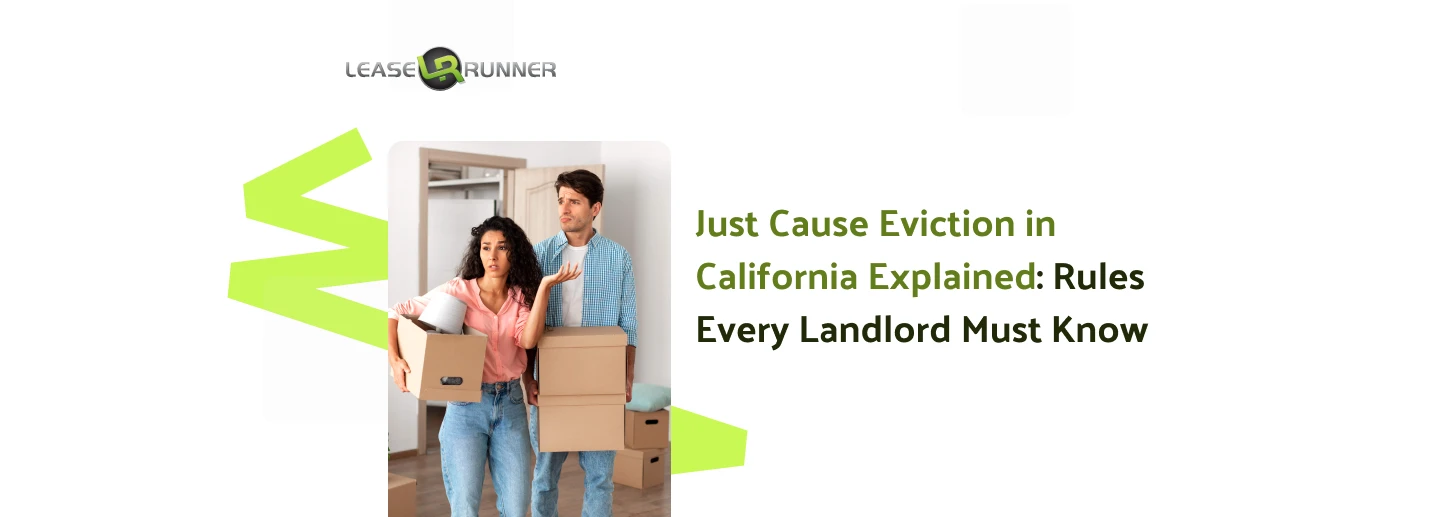Starting an eviction process involves more than sending a notice, it requires planning, legal compliance, and budgeting. Many landlords ask how much for an eviction notice in 2025, and the answer depends heavily on state laws, service methods, and additional expenses such as court filing fees. Even minor choices can add up quickly.
This guide presents a detailed cost breakdown, including typical fees, optional expenses, and practical tips to manage the process efficiently.
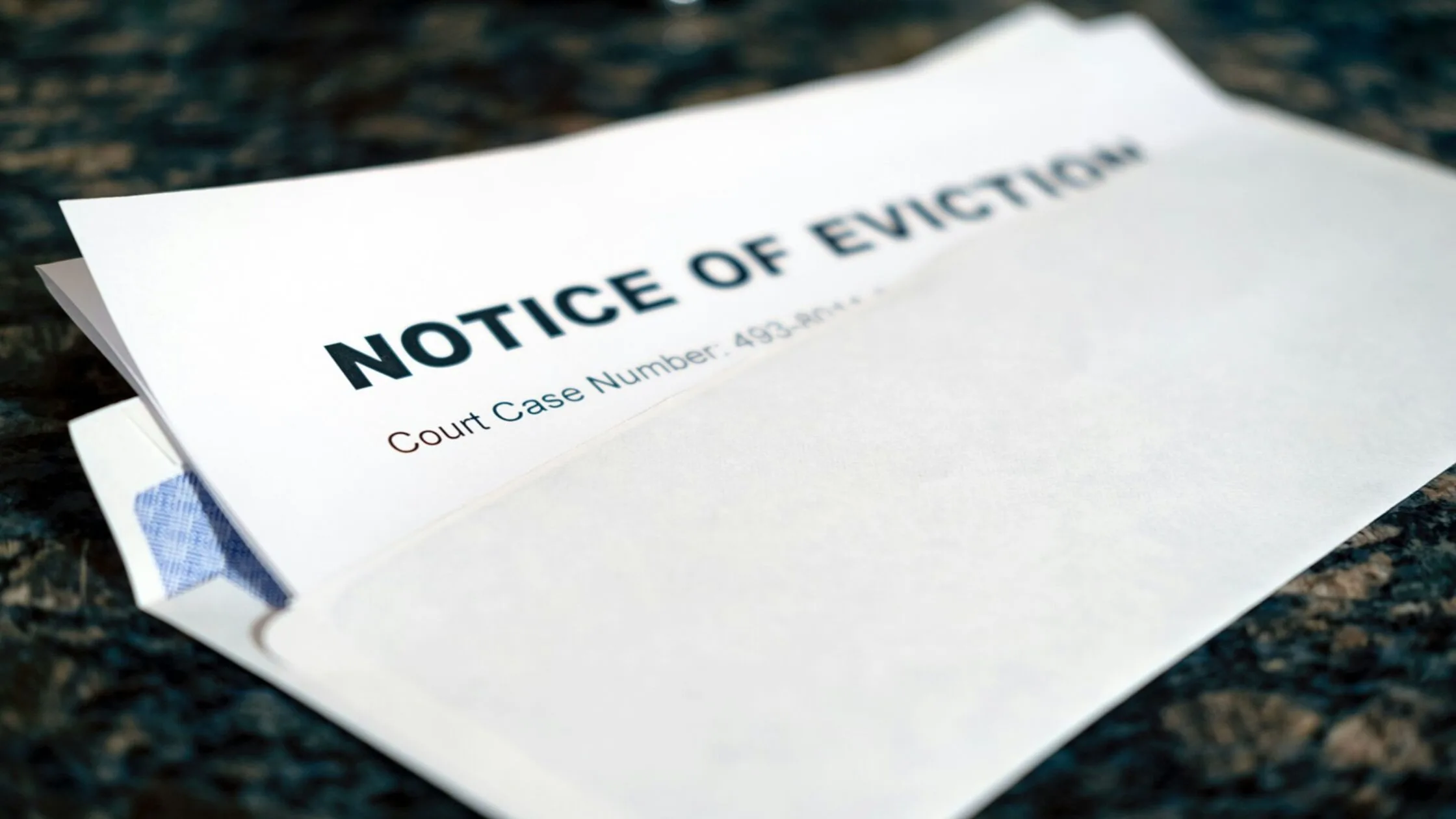
Before going into detail, here’s a quick summary table of eviction costs, including notice and other related fees:
What is the cost of an eviction?
Evicting a tenant is a multifaceted process that involves various court-related expenses and administrative work. In 2025, the total cost of an eviction can vary significantly based on location, tenant response, and whether you need to hire legal counsel.
Landlords must also consider who is responsible for legal fees and responsible for court fees, which often depends on the lease agreement clauses. Always check lease terms before filing paperwork to know what can be charged back to the tenant.
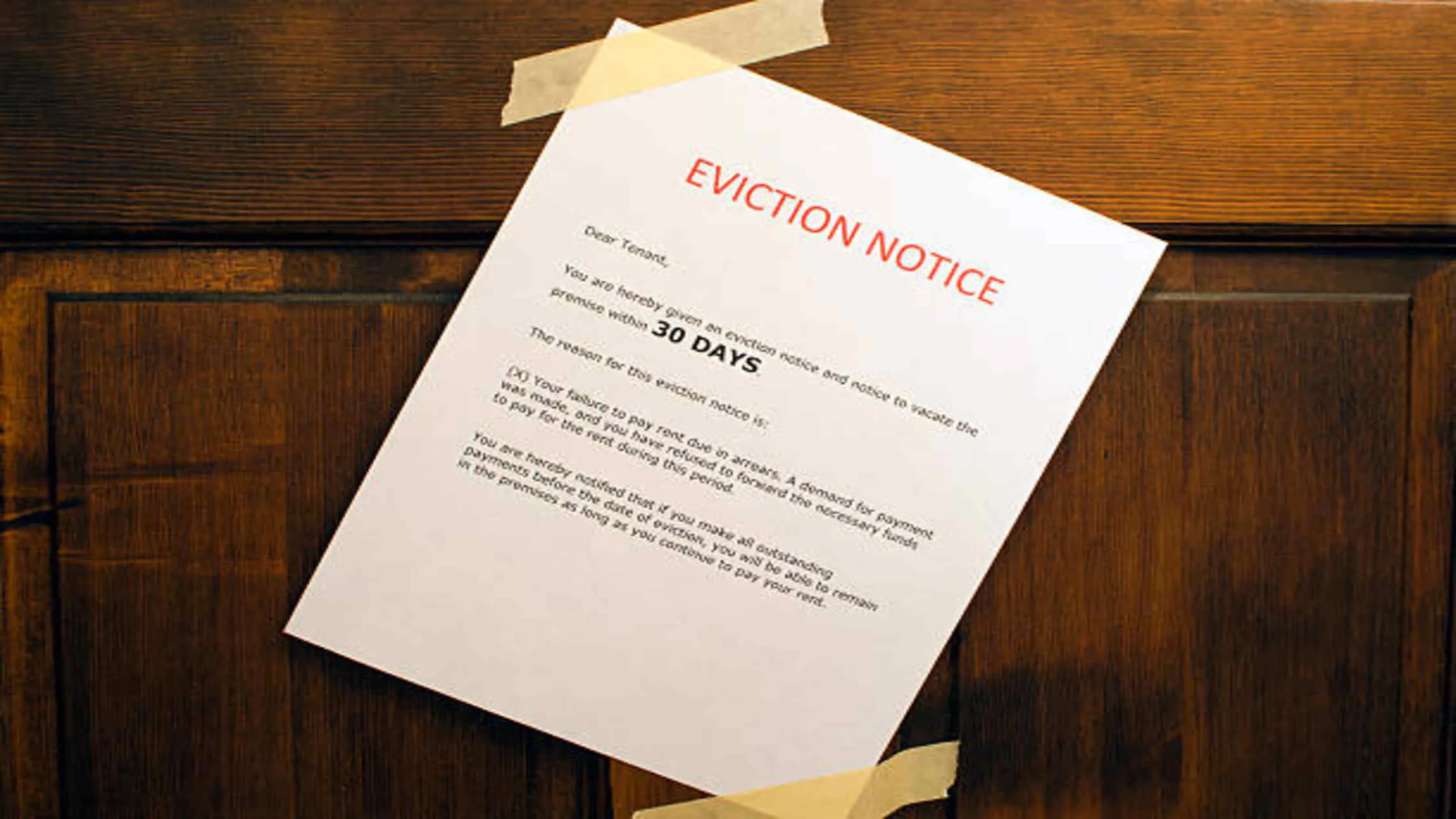
Here's a breakdown of the typical costs landlords may incur during the eviction process:
- Eviction Notice Fees: Most states provide free or low-cost notice templates, though some may charge a small fee for filing or processing.
- Court Filing Fees: If the eviction escalates to court, filing fees are typical and vary by state.
- Service Costs: Serving the notice via certified mail or a process server usually incurs a standard fee.
- Optional Legal Fees: Hiring an attorney is common in complex cases but optional.
- Other Typical Expenses: Minor costs may include copies, delivery confirmation, or administrative fees.
These typical costs give landlords a baseline for planning, helping answer the question how much for an eviction notice without including highly variable or case-specific expenses.
How Much Does an Eviction Notice Cost? ![Average-costs-of-an-eviction-notice-process]()
When most landlords ask “how much for an eviction notice?”, they’re usually thinking of the paper itself. And sure, serving the notice might only cost a few bucks. However, the real cost of evicting a tenant goes way beyond that first step.
The total landlord eviction expenses include service fees, legal fees, and substantial losses like uncollected rent and damages. Let’s break down all the components that factor into the total eviction notice cost.
Eviction Notice Fees: $0–$150
An eviction notice alone may cost little, especially if you draft and deliver it yourself by following the proper lease agreement clauses. But if you want to ensure it's legally valid, expect some fees:
- DIY Notice: $0
- Lawyer/Online Drafting: $50–$150
Court Filing Fees: $50 - $500
When you’ve served the eviction notice and the tenant hasn’t moved or fixed the issue, the next step is to file a lawsuit (or an unlawful detainer case).
Every court charges an eviction filing fee, which varies based on your location. In some areas, it’s as low as $50. In other states like California or New York, it can go up to $450 or even $500. You’ll need to pay this upfront when filing paperwork.
Sheriff Fees: $40–$150
After you file the case, you can't just call or email the tenant to let them know. You are legally required to serve them the court documents, which can add to the fees during the notice period. Some sheriffs charge a flat rate. Others charge per attempt if they can't successfully serve the documents on the first try. A private process server is usually quicker but a bit more expensive.
- Estimated range: $40–$150 (sheriff)
- Private process server: $75–$200
Service of process fees are a typical part of the eviction process and should be factored into the total cost when calculating how much for an eviction notice.
Attorney Cost: $300 to $1,000
While optional, hiring a lawyer is often the smarter move if the tenant fights back, files counterclaims, or if you’re dealing with strict regulations on topics like no-fault eviction.
- Uncontested Eviction: If the tenant does not dispute the eviction and all paperwork is in order, attorneys typically charge a flat fee ranging from $300 to $1,000. This covers drafting documents, filing with the court, and guidance throughout the process.
- Contested Eviction: If the tenant fights the eviction, files counterclaims, or the case becomes complex due to local rent control or legal challenges, attorney fees are usually hourly, ranging from $150 to $400 per hour. Contested cases can significantly increase total costs depending on the length and complexity of the legal proceedings.
Property Damage Repairs: $200–$5,000+
Unfortunately, some tenants don’t leave quietly. You might walk into a unit that needs serious repair: holes in the walls, trashed carpet, broken appliances, or worse.
Not every eviction ends in damage, but it’s common enough to factor into your budget. You’re responsible for making the place rentable again.
- Estimated range: $200–$5,000+ (depending on damage)
Lost Rental Income: 1–3 months’ rent
While you’re going through the eviction process, you’re not collecting rent. In some areas, it takes 30 to 90 days (or longer) from notice to lockout. This can severely impact your rental property cash flow.
- Estimated loss: 1–3 months’ rent
Property Turnover Costs: $150–$1,000+
Even after the tenant is out and repairs are done, there are more costs: changing the locks, deep cleaning, paint touch-ups, and the cost of finding and tenant background screening a new renter. These property turnover costs add up fast, even in the best-case scenario.
- Estimated range: $150–$1,000+
To summarize, here are the details of the components in eviction notice costs:
Factors Affecting Eviction Notice Costs
The total cost of an eviction notice isn’t fixed. Several factors influence how much landlords will ultimately spend. Understanding these variables helps landlords budget and plan the eviction process effectively.
1. State and Local Laws (Jurisdiction)
This is the biggest factor determining your total cost.
- Tenant Protections: States with strong tenant protections (like California or New York) often have longer required notice periods, higher filing fees, and court systems that are slower, leading to higher lost rental income.
- Filing Fees: The required eviction filing fee for an Unlawful Detainer case is set by the county or state. This fee alone can vary from $50 in some jurisdictions to over $500 in others.
- Required Notice Types and Service: Some jurisdictions require a private process server or certified mail for proper service, adding to the immediate eviction fee. Others allow simple posting. You should review the types of eviction notices permitted in your area.
2. Tenant's Response (Contested vs. Uncontested)
The tenant's reaction dictates whether your case will be an efficient legal transaction or a long, expensive fight.
- Uncontested: If the tenant vacates after the notice or fails to appear in court, the eviction costs are limited to filing fees and service fees.
- Contested: If the tenant hires a lawyer, files counterclaims, or requests a trial, your eviction attorney cost will skyrocket due to hourly billing and prolonged court time, significantly increasing the total cost of evicting a tenant.
3. Use of Legal Representation
While not mandatory for every eviction, professional legal advice is a major cost driver.
- DIY Eviction: If you handle all paperwork and court appearances yourself, you eliminate eviction lawyer fees, saving hundreds or thousands. This is only advisable for straightforward, uncontested cases in landlord-friendly states.
- Hiring an Attorney: Attorneys ensure legal compliance and are essential for complicated cases, but their fees—ranging from a $300 flat fee to $400 per hour—are often the single most expensive line item in the budget. The complexity directly affects the eviction attorney cost.
4. Duration of the Process
Every day the process is drawn out increases the overall financial burden. You can use an eviction check tool to estimate the timeline for your state or check how long does an eviction take.
- Lost Rent: This is often the largest hidden cost. If the eviction takes 60 days instead of 30, you immediately lose an extra month’s rent. The longer it takes from the initial notice until the final lockout, the higher the total cost.
- Legal Fees: Longer cases mean more hearings, more paperwork, and more billable hours for a lawyer.
5. Property Damage and Turnover
While not a direct legal fee, the aftermath of the eviction contributes heavily to the total eviction costs.
- Intentional Damage: Tenants may cause spite damage upon leaving, resulting in costly repairs that far exceed the security deposit.
- Cleaning and Repairs: The more time and money needed to clean, paint, and repair the unit to prepare it for a new tenant (property turnover costs), the higher the final bill for the landlord.
The Full Cost of Eviction Beyond Notice Period: Court, Attorney & Aftermath
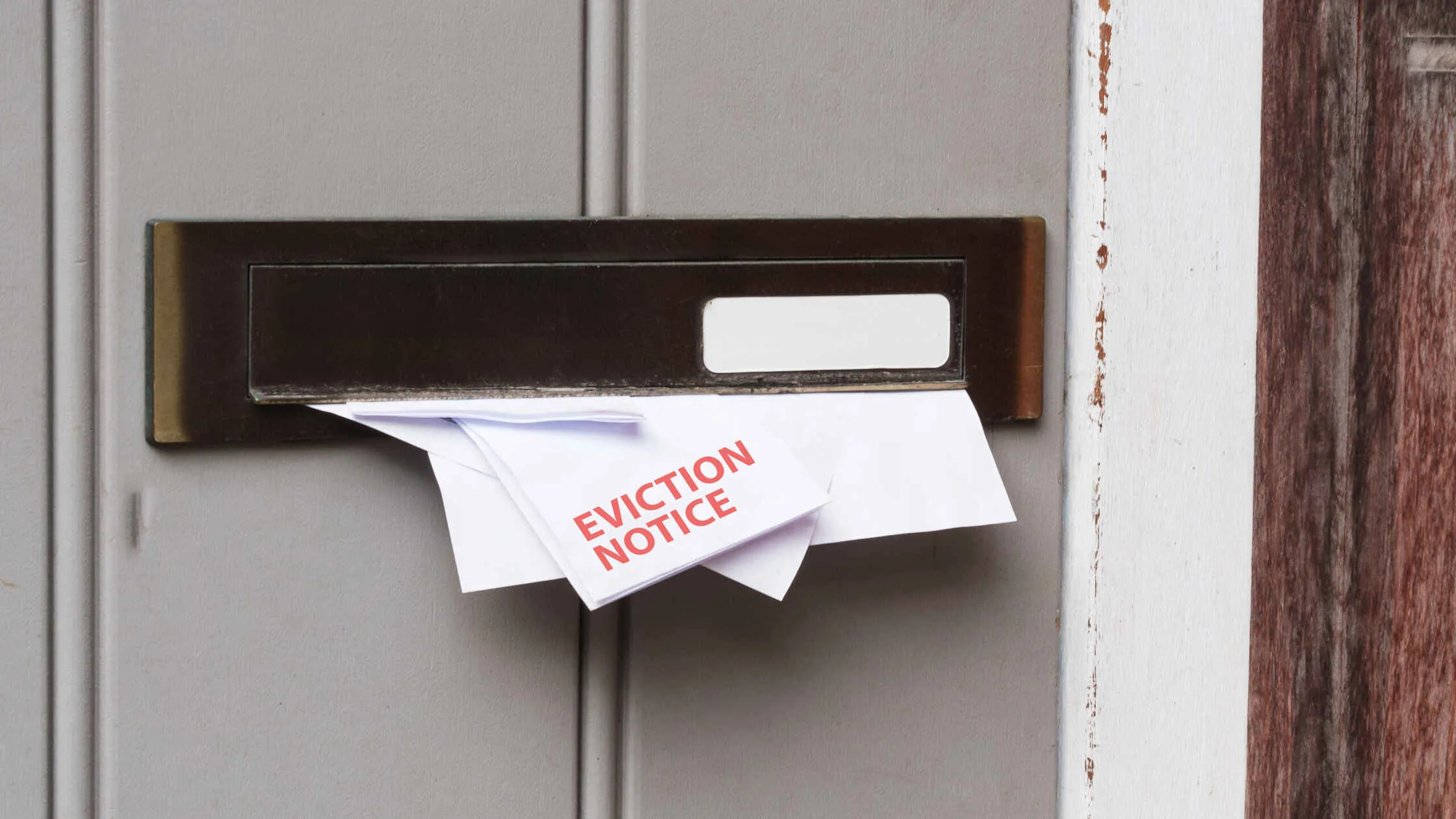
Beyond the eviction notice, the true cost of an eviction depends on the tenant, the situation, and how your local court system handles these cases. Understanding these factors is key to knowing the full answer to how much for an eviction notice and the entire process.
Uncontested vs. Contested Evictions
Most landlords hope for an uncontested eviction. That’s when the tenant either moves out on their own after the notice or doesn’t show up in court. You follow the legal steps, get a judgment, and the sheriff handles the rest. In these cases, you’re mainly paying court fees for eviction, service fees, and maybe a flat-rate attorney if needed.
- Uncontested eviction costs (average): $500–$1,500
- Timeframe: 3–6 weeks
Contested evictions are where things get expensive. If the tenant decides to fight the case, files a response, claims discrimination or unsafe living conditions, or simply drags things out, everything slows down. You may need to go to multiple court hearings, hire a lawyer, and deal with delays.
- Contested eviction costs: $2,000–$5,000+
- Timeframe: 2–3 months or more
The legal system gives tenants a lot of chances to respond or delay the process, and every delay means more rent lost and possibly more costs on your side.
Property Damage, Legal Disputes & Tenant Refusal
A tenant who refuses to leave, damages your unit out of spite, or clogs the process with legal claims can end up costing you thousands beyond the basic eviction fees.
- Property damage: Holes in walls, broken doors, ruined appliances, and trash left behind can turn a $1,000 security deposit into nothing. Cleaning alone can be a huge project.
- Legal disputes: If the tenant files a countersuit, claims harassment, or tries to use technicalities against you (like improper notice), you may end up needing legal backup. Lawyers charge by the hour.
- Refusing to leave: Even after you win in court, the tenant might still stay put. You’ll need to get the sheriff involved, which can take extra time and fees.
Evicting a Roommate vs. a Lease-Holding Tenant
Evicting someone who’s on the lease is a pretty standard legal process. You serve the notice, file the paperwork, and follow your state’s laws. But evicting a roommate can get messy fast.
For roommates not on the lease, you’re usually looking at a different legal path. In some states, it’s treated more like removing a guest or even a squatter. You might have to go through a separate civil eviction or forcible detainer case.
Evicting a co-tenant on the lease, though, is much more straightforward. You follow the same legal eviction process as you would for any other tenant, because they signed the rental agreement.
Roommate eviction complications:
- May require proving they had no legal right to live there
- Some states require you (as the primary tenant) to act as the “landlord” in court
- It can be emotionally harder, especially in shared living spaces
Eviction Notice Costs by State: Key Legal Differences
The answer to how much for an eviction notice and the subsequent eviction depends heavily on the state. Tenant-friendly states typically have higher costs and longer timelines.
Kansas
Kansas generally offers a straightforward eviction process, but costs and timelines vary by county. The state allows landlords to move relatively quickly in cases of nonpayment or lease violations.
- Notices: 3-day notice for non-payment; 14-day notice to cure other lease violations
- Court filings: Fees vary by county, generally $35–$101 depending on the amount in dispute
- Service of process: Sheriff or process server fees apply, varying by location
- Landlord-friendly aspects: Courts are reasonably efficient, though some delays may occur in rural counties
Typical costs: $500–$1,500 for a standard eviction
Average timeframe: 3–6 weeks
Louisiana
Louisiana has one of the fastest eviction processes in the U.S., making it relatively efficient for landlords. Procedures are streamlined, though exact costs depend on parish rules.
- Notices: For non-payment of rent, a 5-day notice is typical. For other lease violations, landlords often use a 10-Day Eviction Notice, giving tenants 10 days to correct the issue or vacate the property before filing for eviction.
- Court filings: Approximately $170, depending on the parish
- Service of process: Additional costs may apply for sheriff or process server
- Landlord-friendly aspects: Rapid processing; minimal tenant delays compared to other states
Typical costs: ~$170–$500
Average timeframe: 2–5 weeks
Georgia
Georgia offers a moderately fast eviction process, with costs varying by county and whether the case is contested. Landlords can act quickly for non-payment cases.
- Notices: 3-day notice for non-payment of rent
- Court filings: Fees typically $60–$100, depending on county
- Service of process: $25–$50 for sheriff service; higher for private process servers
- Landlord-friendly aspects: Quick court schedules; less extensive tenant protections than states like California
Typical costs: $177–$310 for uncontested evictions
Average timeframe: 2–4 weeks for a basic eviction
California
Evicting a tenant in California is expensive and time-consuming. Between court backlogs, tenant-friendly laws, and required legal procedures, you’ll likely spend more and wait longer than in most other states.
- Court fees for eviction are on the higher end
- Sheriff lockouts can take several weeks
- Tenant protections often give renters more time and legal grounds to fight eviction
- Many landlords end up needing legal help, even for simple cases
Typical costs: $3,000–$7,000+
Average timeframe: 2–3 months (or more in cities with backlogged courts)
Texas
Texas is one of the more landlord-friendly states when it comes to evictions. The process is faster, and the overall costs are lower. Courts tend to move quicker, and there's less red tape compared to states like California or New York.
- Notices can be as short as 3 days for non-payment
- Court filings are affordable in most counties
- Fewer tenant protections mean fewer legal delays
- Great for landlords handling evictions without an attorney
Typical costs: $1,500–$4,000
Average timeframe: 2–4 weeks for a basic eviction
Maryland
Maryland has a balanced approach. It’s not as tenant-friendly as California, but it also isn’t as quick as Texas. The procedures are strict, so everything must be done by the book, but the costs are generally more reasonable.
- Filing fees and service fees are moderate
- Baltimore City and some counties may have longer timelines
- Landlords can often manage the process without a lawyer, but legal advice helps if tenants contest
Typical costs: $1,200–$3,500
Average timeframe: 3–6 weeks
Tips to Prevent Eviction as a Landlord
Dealing with an eviction is stressful, expensive, and time-consuming. While sometimes unavoidable, here are steps you can take to avoid getting to that point and save on the overall eviction costs.
- Thorough Tenant Screening: Run full background checks to reduce your risk. (See how to check eviction history).
- Clear Lease Agreements: Ensure your lease spells everything out. The clearer it is, the fewer disputes you'll have.
- Stay in Communication: Offering payment plans or a short grace period can often resolve the issue without legal action and avoid the need to know how much for an eviction notice.
- Offer Cash for Keys: Paying a few hundred dollars to move out voluntarily can save you thousands in legal fees and lost rent.
- Use Property Management Tools or Pros: Using software or hiring a property manager helps you stay organized with payments, notices, and communication.
Conclusion
How much for an eviction notice? The cost can range from $740 to over $7,700, especially when you factor in lost rent, legal fees, court costs, and turnover expenses..
If you're a landlord, you already know it's rarely just about the paper. Evictions cost time, energy, and your rental income. Therefore, the more proactive you are, the fewer costs you'll face.
Explore more on the LeaseRunner Blog to learn the smartest, most legal ways to handle tenant removals.
FAQs
Q1. How much does the court cost for an eviction?
A: Court filing fees vary by state and county but generally range from $50 to $500. Some places charge more, especially in big cities. And keep in mind, you’ll also pay for serving the notice, possible attorney fees, and other related costs.
Q2. How much does it cost to evict a roommate?
Evicting a roommate can be tricky and depends on whether they’re on the lease. If they’re not, it might be treated like removing a guest or trespasser, which can be faster and cheaper. But if they’re on the lease, the eviction process is similar to a regular tenant eviction, meaning court fees for eviction, service fees, and possibly legal fees. Costs typically range from a few hundred to a few thousand dollars.

